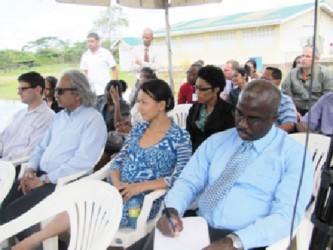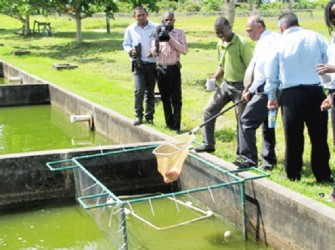The United Kingdom yesterday launched a £1,300,000 ($413m) agricultural diversification programme which is projected to create over 1,000 new jobs.
Launched at the Satyadeow Sawh Aquaculture station at Mon Repos, the Guyana Agricultural Diversification Programme (GADP) aims at upping tilapia exports from 1,000 kg per week to 12,000 kg per week. It is also targeting an increase of non-traditional exports such as bell peppers, hot peppers and butternut squash from 1,000 kg per week to 16,000 kg per week.

It is the latest in a string of similar initiatives by donor countries, multilateral financing institutions and the Government of Guyana to diversify agriculture and boost exports. A Grow More Food campaign by the Guyana Government several years ago saw hundreds of millions of dollars invested but its effectiveness and output have been questioned.
A release yesterday from the project which is to be executed by the Carana Corporation said that it will work at three levels: directly with farmers to pioneer new technologies and increase productivity; streamline paperwork and cut red tape for investors and exporters; and help build ties with new markets and buyers for the sector.
The release added that the UK’s Department for International Development (DFID’s) approach is based on its “Making Markets Work for the Poor” (M4P) methodology. “The M4P approach links good development practice with real world market know-how and ensures sustainability through building functioning market systems that do not rely on external support. GADP focuses on building strong local partners, technology transfer, market linkages, policy reform, access to finance and scaling up agriculture and aquaculture for a minimum market order”, the release said.
It said that GADP is founded on acreage expansion and it will work with airline and shipping companies to lower the cost of exports out of Guyana through a hike in the volume of products and cost effective packaging solutions. Cost-effective and reliable transport has been a problem for agri exporters here.
Farmers interested in the programme can contact Carana Corporation at 223-0632.
The release added that “DFID Caribbean ensures that its programmes demonstrate value for money; showing clear output for UK taxpayer’s pounds spent in the region. DFID Caribbean is determined to be transparent and hold itself accountable to UK and Caribbean citizens.
It said that in Guyana through the Caribbean Development Bank (CDB) administered Caribbean Aid for Trade Regional Trust Fund (CARTFund), DFID is helping make trade quicker and more efficient through an electronic single window facility for processing imports and exports.
In remarks at the event, British High Commissioner to Guyana, Andrew Ayre said that the Guyana Poverty Reduction Strategy pinpointed growth in the agricultural sector as “particularly important for reducing poverty because of the heavy concentration of the poor working in that sector”. Ayre noted that the Survey of Living Conditions indicated that 41% of households under the poverty line were employed in agriculture. He said that by virtue of its impact on the modernisation of agriculture and aquaculture, the up skilling of labourers in the sector and the generation of jobs, the project is likely to help poverty reduction in the rural areas. The High Commissioner also posited that Caribbean agriculture is facing challenges because of the removal of European Union preferences for major agri exports and as a result of trade liberalization.
“Guyana has a unique opportunity to diversify and expand its agricultural exports. It boasts abundant water for irrigation and aquaculture, has vast tracts of productive land which present enormous opportunities for agricultural growth and a continuous year-round growing season that allows for multiple harvests and sales to the European and U.S. markets during winter months. As the only net food exporter in the region, it is often cited as the (potential) ‘breadbasket of the Caribbean’. DFID support will help to establish aquaculture and non-traditional agriculture as viable export sectors, able to attract new foreign and local investment, generate substantial revenues and generate employment in rural areas where poverty rates are highest”, he said.

In 2008, USAID assisted the Government with $11M to establish the Aquaculture Station and to support fish enterprise locally. A release from the Government Information Agency yesterday said that the aim of that support was to have the hatchery at Mon Repos produce 200,000 female fingerlings per year, help farmers to access larger quantities, diversify their income, increase earnings and create 13,000 new jobs.
GINA said USAID has since terminated its support in this regard, nevertheless, Minister of Agriculture Dr Leslie Ramsammy recognised the agency for starting the programme and for the lessons the country would have learnt from it. GINA said that Ramsammy commended DFID for taking up the project left-off by USAID.
The minister said the challenge now, like then, for all partners is to ensure that the resources expended on the project contribute to its sustainable development.
“This funding should be seed money where communities and people grow, and where we leave a legacy of adding to the production and supply chain,” he said.
According to the Minister, Guyana is now over producing tilapia for the local market. He said many aquaculture ponds have become restricted in their production because they cannot sell their product on the local market.
Ramsammy said that there is a huge market just outside the borders of Guyana for tilapia. He said that this year Trinidad is likely to procure a large amount of tilapia from China.
The Minister said that the cost of feed presents a big challenge for sustainability, and that the ministry, in recognition of this, is working with support from research agencies to develop a locally produced fish feed.
CARANA Corporation has over 28 years of experience implementing economic development programmes in countries around the world and has been operating in Guyana since 2004, the release said.





